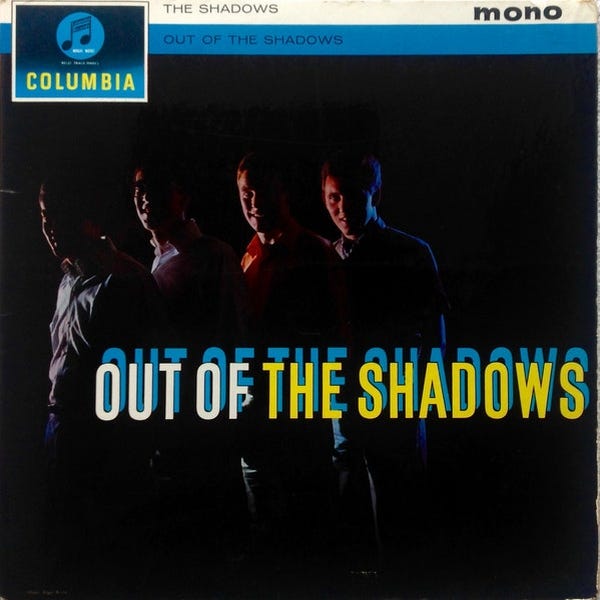Review: The Shadows - Out Of The Shadows (1962)
Tracks: 1) The Rumble; 2) The Bandit; 3) Cosy; 4) 1861; 5) Perfidia; 6) Little ‘B’; 7) Bo Diddley; 8) South Of The Border; 9) Spring Is Nearly Here; 10) Are They All Like You?; 11) Tales Of A Raggy Tramline; 12) Some Are Lonely; 13) Kinda Cool.
REVIEW
The Shadows’ second album followed more or less the same formula as their first, so there is no need for any further generalizations — let us just dive straight into the material, which is fairly simple and generally likeable. One thing that is already alarming is the lower ratio of original numbers by the band members: altogether just 5 out of 13 tracks, plus one number credited to Cliff Richard. Perhaps, at this point, it was simply a coincidence, but it could also reflect a touch of boredom. Of course, as of late 1962, there was still nobody around to dethrone the Shadows from their rule of the British charts (the album dutifully reached #1, just like its predecessor), but it was still a rule enforced by a strictly unchanging formula, and who lives by the formula, dies by the formula.
Still, ‘1861’ is as nice as a British pop-rock reinvention of American mid-19th century marching band music can be, with Hank Marvin at the top of his melodic sensitivity as he recreates that trusty old patriotic vibe with a clean, sharp tone (I do wish there would be at least the slighest bit of variation between the two «verses», though). ‘Spring Is Nearly Here’ (maybe not the most perfect title for an October release) is a nice little waltz, which Hank largely rides through on his highest notes to override Norrie Paramor’s generic orchestration. The funnily-titled ‘Tales Of A Raggy Tramline’ is a fast and friendly pop ditty with great synergy from Brian Bennett’s drums, Jet Harris’ bass, and Hank’s lead parts — genuinely outstanding musicianship for a pop record in 1962. (I assume that is Jet Harris, though it might as well have been Brian "Lickorice" Locking, who ended up replacing Harris midway through the sessions). And ‘Kinda Cool’ is a good showcase for Marvin’s piano skills, even if he tends to play the piano in much the same way as he plays his guitar — sharply staccato, each note a part of a carefully premeditated geometric structure and each melodic phrase and verse repeated several times in the exact same way so you might actually get it all memorized upon your very first listen. Some of these lines may very well have been learned from the likes of Ray Charles, but good old Ray, of course, would never have treated any of his recording sessions as training exercises.
Top of the crop is ‘Little B’, the most outstanding thing about which is its length — a jaw-droppin’ five minutes, most of which are occupied by an extended drum solo from Bennett. I do not know if this was the first ever lengthy drum solo on a UK pop record, but definitely the first one known to me, and definitely a sign that the Shadows were pining for some jazz credentials. This may not exactly be Buddy Rich quality stuff, but Bennett’s performance is both fluent and varied, and I would definitely take it over dozens and dozens of rock-era drum solos by second-rate artists (I mean, people like John Bonham could get away with it due to sheer monstruous power, but the majority of rock drummers who could not match that power just plain sucked at this business). The main guitar theme, with its Carl-Perkins-meets-James-Bond riff, is no slouch either, though way too short relative to the drum solo.
Of the non-original tracks, three are vocal numbers, and they are predictably the least impressive of the bunch: Bruce Welch is most certainly no ‘Bo Diddley’ (predictably, they play it with all the energy of an electric guitar unplugged from its amp), the collective Shadows are no Searchers when it comes to singing folk-pop harmony (on Tim Gale’s ‘Are They All Like You?’), and yet another attempt to go Mexican on our ears (‘The Bandit’, from Michael Carr’s songbook) is just as bland and limp for a mariachi anthem. But as soon as they shut their mouths and just play, life begins anew: Michael Carr’s famous ‘South Of The Border’ gets a crystal clear, upbeat, uplifting arrangement with yet another of Marvin’s perfect geometric constructions — the band is tight as a clock, and Hank’s lilting, drip-dropping notes mark each second with algorithmic accuracy that manages to delight rather than annoy.
Indeed, it is quite amusing how this perfectly gelling bunch of instrumentalists becomes a boring band of nobodys as soon as even a small amount of their brainpower refocuses on the vocals — and while it is understandable that they did not want to bring in Cliff to help them out (if this was going to be a «The Shadows» album, it was going to be one through and through), the idea that The Shadows, as a band, could be capable of anything was just wrong. The instrumentals are so tight, and the melodies so perfectly shaped that it is rather easy not to notice their shortcomings, such as the lack of spontaneity, the lack of primal power, the limited musical vocabulary, the unwillingness to take risks and experiments, etc. But when the vocal numbers start coming in, these Gods of instrumental performance suddenly expose themselves as mere mortals, with very disappointing limitations — and, of course, it becomes crystal clear why the Beatles would soon sweep them away despite possessing only a small fraction of their instrumental skills.
Only Solitaire: The Shadows review page




